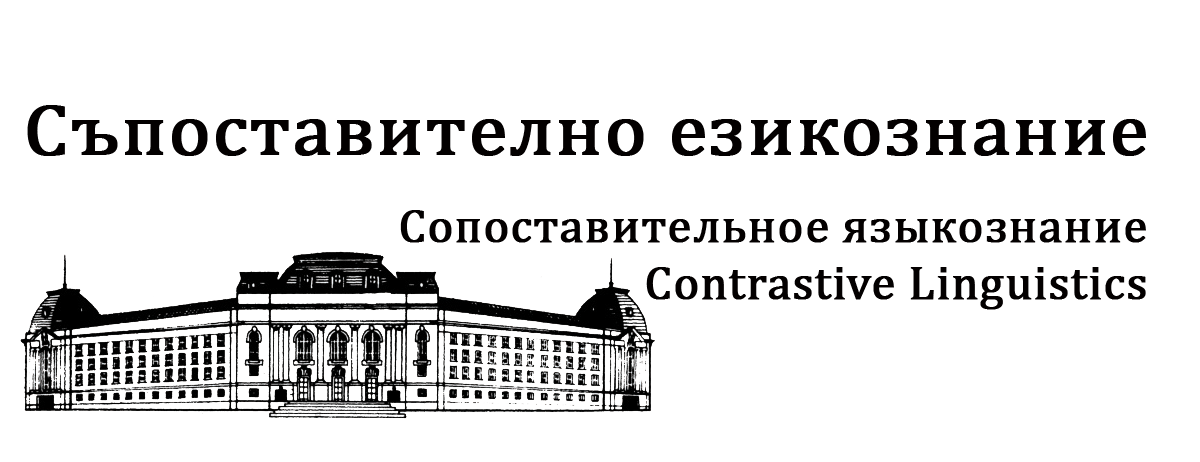ДАНЧЕВ, Андрей – За някои страни на съпоставителните изследвания (On some aspects of contrastive linguistic studies). 1976 (І), № 1, 6–26.
The author of this paper examines some of the terminological, methodological and theoretical problems of contrastive linguistics. The generative approach is considered to provide a convenient basis for contrastive analysis, especially if a common deep structure for all languages is assumed. The problem of describing or formalizing this hypothetical deep structure by means of a metalanguage can be circumvented by using one of the two or more contrasted languages as a metalanguage with respect to the other language or languages. New insights into the structure of a given language may thus be gained, because what in one language is part of the deep structure is not infrequently marked explicitly in the surface structure of another language. A case in point is the category of aspect in English and Bulgarian, which is most profitably studied by regarding it as a category of the deep structure.
КАРААНГОВА, Маргарита – Суфикси за емоционална оценка със специална консонантна характеристика в белоруския и българския език. 1976 (І), № 5, 116–125.
The article focuses on Byelorussian and Bulgarian suffixes expressing emotional attitude and diminutives in particular. The study examines the consonants appearing in these suffixes in the two languages in the derivation of words belonging to various word classes (nouns, adjectives, numerals, pronouns, verbs and adverbs). The article shows the comparative picture in the two languages, representatives of two branches of the Slavic family.
КОТОВА, Надежда В., Мирослав ЯНАКИЕВ – Какво е най-удобно да съпоставяме количествено в славянските езици (Что в славянских языках больше всего поддается количественному сопоставлению). 1976 (І), № 1, 27–39.
Рассматриваются некоторые предлагаемые математической статистикой операции, с помощью которых надежность эксплицитно количественных утверждений в свою очередь оценивается количественно, причем учитываются два влияющих на нее фактора – как объективная, так и субъективная флуктуация численной оценки.
МАНЧЕВ, Красимир – Принципи на типологичното изследване на езика (Principes de l’étude typologique du langage). 1976 (І), № 1, 40–57.
Par cette étude l’auteur soutient la thèse que la définition des caractères spécifiques d’un idiome implique par nécessité naturelle l’existence de caractères génériques de l’ensemble des idiomes.
KOSESKA-TOSZEWA, Violetta (Warszawa) – Informacja o określoności w znaczeniach temporalnych form werbalnych w języku polskim i bułgarskim. 1976 (І), № 2, 45–55.
This is a fairly detailed discussion of the formalism to be used in the description of verbal temporal meanings in Polish and Bulgarian within the Polish-Bulgarian contrastive project. In our choice of methodology we are led by the desire to achieve an explicit and consistent description of verbal forms and their temporal functions.
ORZECHOWSKA, Hanna (Warszawa) – Imiesłowy przysłówkowe we współczesnym języku polskim i bułgarskim (Frekwencja i podstawowe różnice w dystrybucjach). 1976 (І), № 2, 114–127.
The article analyses present active participles (referring to activities simultaneous with the activity demoted by the predicate). The goal is to describe the actual state of affairs rather than illustrate the normative postulates established for the two literary languages under investigation – Bulgarian and Polish.
SZYMAŃSKI, Tadeusz (Kraków) – Główne modele derywacyjne czasowników onomatopeicznych w języku bułgarskim. 1976 (І), № 2, 181–195.
The article is based on part of the author’s study The derivation of onomatopoeic and expressive verbs in Bulgarian. It is an abridged presentation of some of the results contained in the first part of this work, based on material from Standard Bulgarian and some of the Bulgarian dialects.
